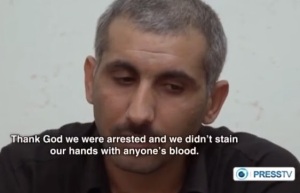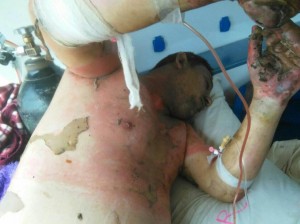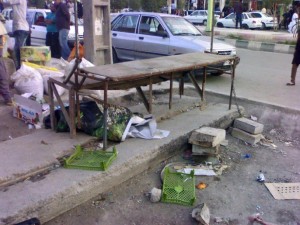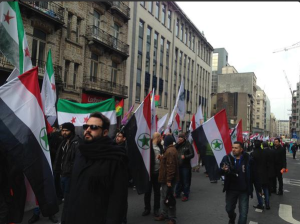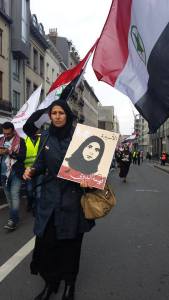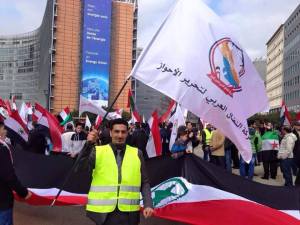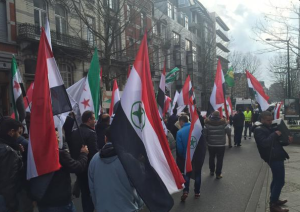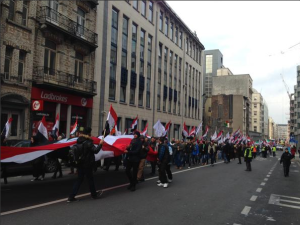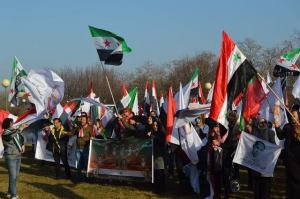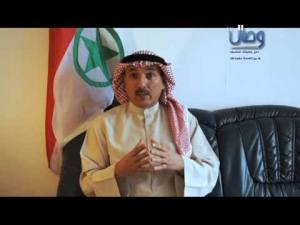
The voice of the Syrian people. It would be a novel idea for activists to actually LISTEN, KNOW what the requests and demands are of the oppressed in areas that the activists “speak for” them. They might be surprised to learn that not only do those in Syria KNOW what they want, they want to stop dying and suggest a possibility. But, of course, Western activists “know better than they do what is right for them”!
WRITTEN BY DAVID NAVA
There is a rot eating away at the moral courage of Americans. I see the rot when I talk to people about the humanitarian crisis in Syria. I see the rot when I ask them, “aren’t the crimes of Assad despicable?”, and in response they turn their faces, or their chins touch their chests.
In the face of atrocities, silence.
When we cannot find the moral courage to condemn mass murderers and torturers than we have fallen into a moral swamp.
Lift your chins from your chest. Find the courage to defend the basic principles of human rights. Your courage is needed.
There are two huge difficulties facing us here in the US: 1) there is the infuriating and ugly problem of the “deniers” and the misinformation spread by Fox news and company–at the service of Big Oil; 2) there is the problem that Americans are turning away from the world, rather than waking up to the urgent need to become aware of our place in the global community–a community that is everywhere struggling for democratic rights and social justice.
This second issue is deeply disturbing because it is a sentiment that is gaining traction even among Leftists.
I find the problem most acutely demonstrated by anti-war groups that are opposed to a No Fly Zone in Syria, not on the grounds that this might drag the US into a war with Assad’s regime (this argument is weak because of the relative correlation of forces–Assad would never challenge US air power–but at least it does not violate moral principles); rather, these groups (ANSWER etc.) reject a No Fly Zone because they accept Assad’s claim that the conflict was created artificially and is strictly between the regime and foreign fighters! In other words, ANSWER defends the dictatorship! While Scientific American has the political maturity to carefully state that changing climate conditions are exacerbating social struggles, ANSWER simply denies there is a real social conflict! This is an unmitigated moral disaster for our anti-war movement. The most-widely recognized leadership of our anti-war movement has adopted the propaganda of a regime guilty of destroying its own country in order to preserve its rule!
Even in regards the problem of sectarian violence, the Jihadists forces, this position–defending the Assad regime–is completely indefensible. How will it be possible to defeat the forces of sectarian violence? Militarily? Perhaps. For a while. Perhaps IS and Al Qaeda can be destroyed. Yet, in the absence of stable democratic societies, will not these forces return, again and again? Of course they will. The military strategy is a recipe for never-ending war, and a never-ending war at the service of repressive regimes! If we are anti-war, if we are truly anti-war, we have no choice but to support the struggle for democracy. There simply is no alternative.
Concerns raised by members of the revolutionary Left that supporting a No Fly Zone is a trap set by imperialism is merely a repetition of the same error: the victory of democratic forces would be a huge blow to imperialism. Controlling corrupt, repressive regimes is how contemporary imperialism works, from Mexico to Egypt. The only difference in the case of Syria is which imperial power is in control. Syria falls under the Russian-Iranian orbit, instead of the US’s. So this makes Assad’s regime progressive?! The argument is absurd upon recognition of its content. The anti-imperialist argument is not an argument to support one imperialist camp over another; the anti-imperialist argument has always, at root, been about support for the right to self-determination of ALL peoples against ALL foreign masters. (You will never find Lenin calling Ottoman domination of the Middle East progressive relative to domination by French or English imperialism. Lenin supported the struggle for self-determination; this was the foreign policy–anti-imperialist–of the USSR, at least before Stalin.)
In any case, the moral imperative of saving innocent human beings trumps all geo-political questions. To the people being terrorized by barrel bombs, it does not matter if the bombing has been stopped by an imperialist power. Is it any wonder than that the demand for a No Fly Zone comes from the Syrian people?
While I am talking about the Syrian’s right to self-determination, let me pause to consider another objection to the demand for a No Fly Zone: some Syrians are opposed to a No Fly Zone because they support Assad; would we be trampling their rights? Let us pause to think about what happens in democratic and social revolutions. Is it ever true that 99% of the people reach agreement and simultaneously rise up to fight oppression? No, this has never happened. Revolutions always advance in a combined and unequal manner. Our own revolution, in 1776, was fought roughly with 1/3 of the population supporting King George. When we finally got around to defeating slavery in the South, we were only able to do so by killing many tens of thousands of poor White sharecroppers, who did not own slaves. Mussolini and Hitler enjoyed the support of many of their people. How then do we recognize which side in a civil war or revolution is advancing a people’s democratic rights? Well, there is no easy way. We must do our homework. We must study history and think critically; but this is the only way to understand any social historical process. If we do our homework in regards Syria we see that the regime is built on repression, that it has consistently exploited sectarian strife to justify its rule, that it does not advance the sovereignty of the people.
How can we call for the US to impose a No Fly Zone and also oppose US imperialism in the Middle East? We do so by also demanding an end to all US military aid to the coup in Egypt and to Israel, and the redirection of this aid to the survivors and refugees of Gaza and Syria. There is no sense in which these demands would strengthen US power in the Middle East. In other words, we do not try to sweep the bloody humanitarian crisis under the rug because recognizing the disaster might be too complicated. On the contrary, we adopt the humanitarian demands because that is the morally correct thing to do. Moreover, imperialist interventions in the region are indirectly responsible for the humanitarian disaster. For decades our government has undermined the democratic movements and strengthened the dictatorships. The USSR also wrought terrible damage by supporting another camp of tyrants. The solution is to finally support the struggle for self-determination. There is no alternative. The victory of the dictatorships will not bring stability because they have nothing to offer the people.
The issue is deeply complex. The humanitarian crisis, however, is painfully simple, very painfully simple. We have the power to protect civilians from aerial bombardment. Therefore we have a moral duty to act. We may not understand the struggle, but there is one good thing we can do, we can stop the bombardment of civilian populations.
